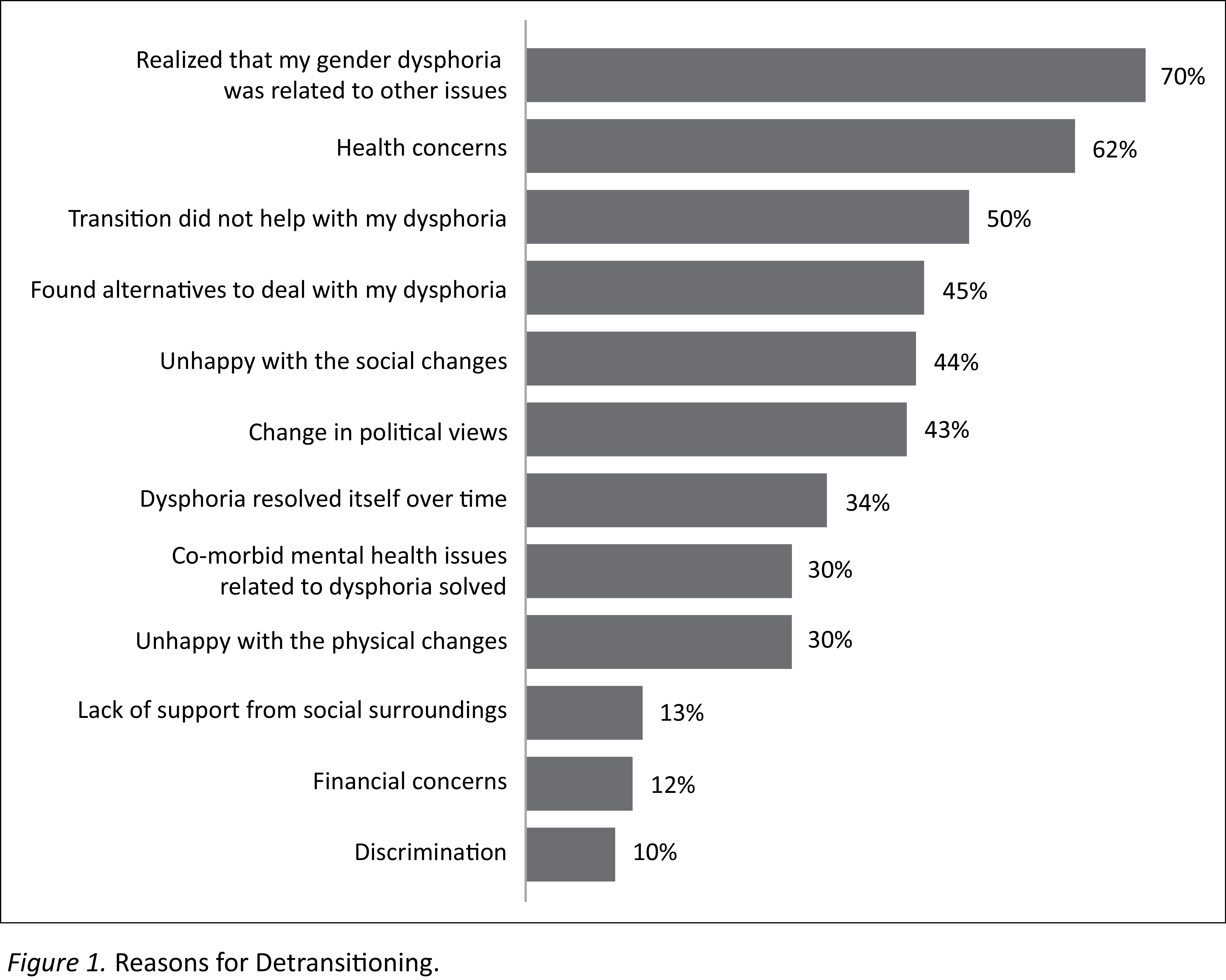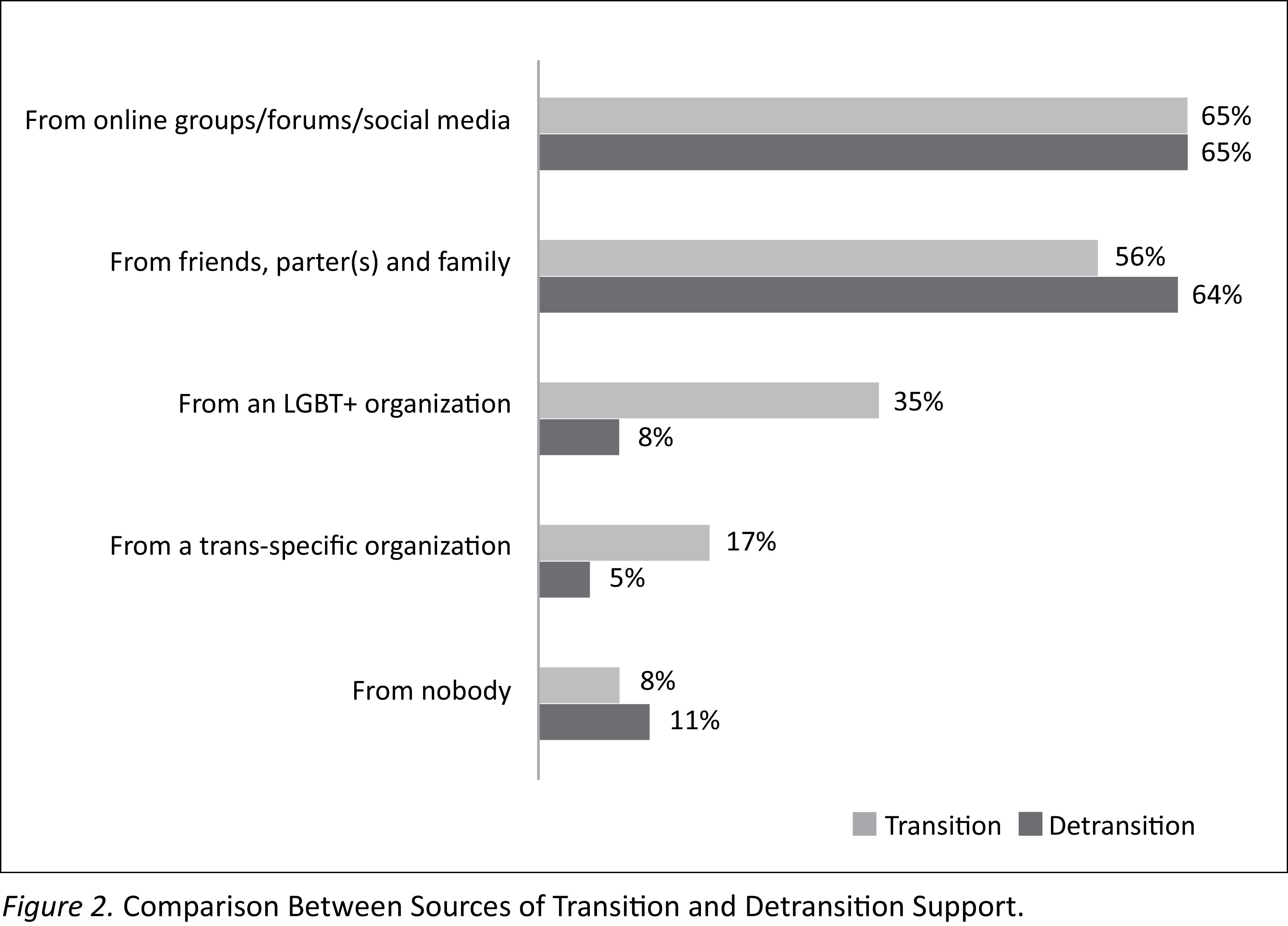Survey on Detransition-Related Needs and Support
This is a summary of the results of a survey conducted by Elie in November 2019.
The full research article can be accessed here.
Aim: The aim of this research was to analyze the specific needs that detransitioners from online detrans communities are experiencing, and to look at the support that they are receiving in order to fulfil these needs.
Methods: A cross-sectional survey was conducted, using social media platforms to recruit detransitioners. Access to the questionnaire was open from the 16th of November until the 22nd of December 2019.
Participants: A total of 237 detransitioners took part in the survey. The big majority was female; 217 female (92%) for 20 male respondents (8%). The average age is 25 years old, ranging from 14 to 64. Half of the sample reported coming from the United States and over a quarter from Europe. Fifteen respondents are from Canada, twelve from Australia, and one from each of the following countries: Brazil, Kazakhstan, Mexico, Russia and South Africa.
65% of participants transitioned both socially and medically; 31% only socially.
Out of the respondents who medically transitioned, 46% underwent gender affirming surgeries.
22,8 years is the average age of detransition.
4,7 years is the average duration of transition.
51% of the sample started socially transitioning before the age of 18.
25% started a medical transition before that age as well.
Results:
Participants background
Comorbidities
The sample showed a high prevalence of comorbidities in the participants. 54% reported having had at least three diagnosed co-existing conditions.
The most prevalent diagnosed conditions found in the sample are:
1) Depressive disorders (69%)
2) Anxiety disorders (63%)
3) Post-traumatic stress disorder (33%)
4) Attention deficit disorder (24%)
5) Autism spectrum condition (20%)
Transition and detransition experiences
45% of the whole sample reported not feeling properly informed about the health implications of the accessed treatments and interventions before undergoing them.
Main reasons for detransitioning:

Source: Figure 1. Reasons for Detransitioning. From Vandenbussche, E. (2021). Detransition-Related Needs and Support: A Cross-Sectional Survey. Journal of Homosexuality. DOI: 10.1080/00918369.2021.1919479
Detransition-related needs
Psychological needs |
|
| Social needs |
|
|
Medical needs |
|
| Legal needs |
|
Detransition-related support
Sources of support during transition and detransition:

Source: Figure 2. Comparison Between Sources of Transition and Detransition Support. From Vandenbussche, E. (2021). Detransition-Related Needs and Support: A Cross-Sectional Survey. Journal of Homosexuality. DOI: 10.1080/00918369.2021.1919479
29% reported having received support for their detransition from the medical professionals that helped them during their transition, while 38% sought support from a new therapist/doctor.
51% of the participants reported having the feeling of not having been supported enough throughout their detransition.
A third of the participants left further comments about the support – or lack thereof – that they received during their detransition process. The most common themes were:
Loss of support from the LGBT+ community
“The LGBT+ community doesn‘t support detransitioners and I lost all LGBT+ friends I had because they deemed me transphobic/terfy, only non-LGBT+ friends supported me.”
“I've been shunned by most of my trans identifying friends. I had to leave my old doctor, therapist and LGBT group out of shame and embarrassment.”
Negative experiences with medical professionals
“I needed gender and transition experienced providers to assist with my medical detransition, but none of them seemed to understand or provide the type of care I needed, despite my self-advocacy. I got better care from providers outside of the LGBT and transgender specialty clinics.”
“As soon as I 'detransed' I was discharged from all gender services, despite asking for help in dealing with sex dysphoria should it arise again.”
Difficulty to find a detrans-friendly therapist and lack of offered alternatives to transitioning
“I struggled to find a therapist who supported questioning my trans identity and considering alternatives to transitioning; most only knew how to encourage transitioning and reinforced the harmful ideas that led to my wrongly identifying as FtM in the first place.”
“The gender clinic I went to basically told me that the only way to deal with gender dysphoria was transitioning even when I told them I wanted to detransition.”
“The gender clinic I went to basically told me that the only way to deal with gender dysphoria was transitioning even when I told them I wanted to detransition.”
“The biggest issue for me was that when I did try to get support from a therapist or psychologist on entangling the actual reasons behind my dysphoria and how to deal with it, and deal with detransitioning, nobody had any clue or any experience, so they couldn't help me. Which made me even feel more lonely, and made detransitioning so much harder mentally than transitioning was.”
Note: This is a selection of quotes taken from the summarized study. All the extracts can be found in Table 2, 3 and 4 of the following paper:
Vandenbussche, E. (2021). Detransition-Related Needs and Support: A Cross-Sectional Survey. Journal of Homosexuality. DOI: 10.1080/00918369.2021.1919479
Conclusion:
-
Detransitioners have important psychological needs in
relation to gender dysphoria, comorbid conditions, feelings of regret,
social/physical changes and internalized homophobic or sexist prejudices.
-
Medical support was found to be needed by many, in
order to address concerns related to stopping/changing hormone therapy,
surgery/treatment complications and access to reversal interventions.
-
The study uncovers the importance of spaces where detransitioners
can hear about other detransition experiences and exchange with each other.
-
The support given to detransitioners appears to be
very poor at the moment. Participants described strong difficulties with
medical and mental health systems, as well as experiences of outright rejection
from the LGBT+ community.
-
Many detransitioners described a lack of offered
alternatives to medical transition by mental health professionals and doctors.
-
The results of this study show the urgency to increase
awareness and reduce hostility around the topic of detransition among
healthcare providers and members of the LGBT+ community in order to address the
specific needs of detransitioners.
Original article: Vandenbussche, E. (2021). Detransition-Related Needs and Support: A Cross-Sectional Survey. Journal of Homosexuality. DOI: 10.1080/00918369.2021.1919479
This website and all its images are protected by copyright. Reproducing or distributing an image or part of an image in any form or manner is illegal. They may not be published without prior permission from the founders of Post Trans.
